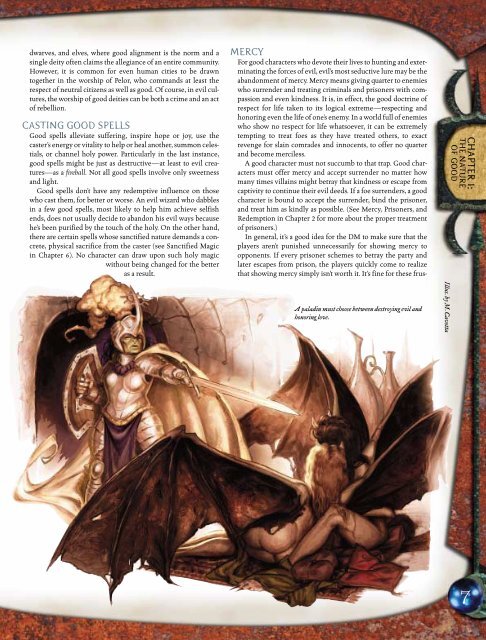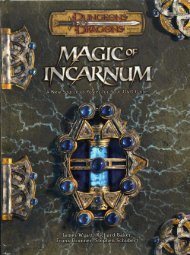CHAPTER 1:THE NATUREOF GOOD6others without reward or even thanks is part <strong>of</strong> a good character’sdaily work.So who are these “others” a good character is supposed tohelp? Again, the “good is not necessarily stupid” rule comes intoplay. Obviously, a good character is not required by her alignmentto help evil characters or those who are working at crosspurposesto a good character’s own goals. However, altruism<strong>of</strong>ten blends into mercy in situations where a villain asks forquarter and aid (see Mercy below). In any case, altruism is temperedby respect for life and concern for the dignity <strong>of</strong> sentientbeings, and good characters balance their desire to help otherswith their desire to promote goodness and life.CHARITYOne specific aspect <strong>of</strong> helping others is charity: providing materialassistance to those in need, particularly those whose situation inlife robs them <strong>of</strong> pride and respect. Offering food to the hungry,clothes to the naked, lodging to the homeless, care for orphansand widows, and hope to the hopeless are among the simplest andyet most pr<strong>of</strong>ound <strong>of</strong> good deeds. Good characters <strong>of</strong>fer this sort <strong>of</strong>assistance to needy people without regard for their moral characterand with the utmost concern for their dignity.The idea that creatures too weak to better themselves deservetheir low position is a hallmark <strong>of</strong> evil dogma. Good charactersreject this notion completely, recognizing that most poor andneedy people are the victims <strong>of</strong> circumstance, not <strong>of</strong> their ownweakness or failings.HEALINGHealing wounds, removing disease, and neutralizing poison area concrete embodiment <strong>of</strong> a good character’s respect for life.These deeds are not inherently good, since they can be performedselfishly or in the interests <strong>of</strong> evil. Even so, healing magicinvolves positive energy, which is closely linked to holy power.Many good characters devote their lives to healing as anexpression <strong>of</strong> their morality. Pelor is a god <strong>of</strong> healing, and hisclerics with the Healing domain make it their mission to sharePelor’s beneficence with others through healing. Even paladins,whose mission is primarily to smite evildoers, have the innateability to heal wounds and remove disease as a reflection <strong>of</strong> theirpure goodness. A character devoted to healing views the powerto heal as a gift <strong>of</strong> celestial powers and is generally careful neverto use that gift in a way that would cheapen or taint it—by healingevil characters, for example. On the other hand, some viewhealing as a means <strong>of</strong> grace, believing that every cure lightwounds cast on a blackguard cannot help but lead the villaincloser to repentance and redemption.PERSONAL SACRIFICEA good character doesn’t just help others or fight evil when it’sconvenient for him to do so. Even the most generous altruism,when it comes without sacrifice or even serves one’s own selfinterest,is neutral at best. A character committed to the cause <strong>of</strong>good champions that cause in any circumstance, <strong>of</strong>ten at greatpersonal risk or cost.Forfeiting any claim on a reward for one’s deeds is a simpleform <strong>of</strong> sacrifice touched upon in the previous section. Voluntarilydonating money, goods, or even magic items to a temple,charitable institution (an orphanage or aid society), or otherorganization is another financial sacrifice <strong>of</strong>ten practiced bygood characters. Exceptionally virtuous characters might swearsacred vows, forever sacrificing the enjoyment <strong>of</strong> some worldlypleasure—alcohol or stimulants, sex, or material possessions—or course <strong>of</strong> action, including violence. True heroes <strong>of</strong> righteousness,all too <strong>of</strong>ten, sacrifice their own lives to save the lives<strong>of</strong> others.WORSHIPING GOOD DEITIESThe deities <strong>of</strong> good are the highest exemplars <strong>of</strong> the principles<strong>of</strong> virtue, righteousness, and purity. By <strong>of</strong>fering them worship,sacrifice, and service, good characters cultivate their own personalvirtue, assist the cause <strong>of</strong> good in concrete ways (supportingthe charitable work <strong>of</strong> the church and strengthening theclerics and paladins who serve as the deity’s agents), and extendthe deity’s reach in the world.Not all good characters worship good deities. Some serveneutral deities like St. Cuthbert, Obad-Hai, or Olidammara,while others put the claims <strong>of</strong> good above the dogma <strong>of</strong> anydeity. Nevertheless, virtually all good characters are willing tocooperate with the churches <strong>of</strong> good deities, recognizing themas allies with a common cause.Unlike evil deities, good deities usually have temples andshrines in open, public places—<strong>of</strong>ten at or near the center <strong>of</strong>bustling cities. In fact, the worship <strong>of</strong> good deities is one <strong>of</strong> theforces that <strong>of</strong>ten helps to cement humanoid communitiestogether, serving to unite the populace in a common activityand a common set <strong>of</strong> ideals. This is particularly common amongnonhuman races <strong>of</strong> good alignment, including halflings,pqqqqrsEXALTED DEEDS AND VILE DARKNESSYour gaming group will make the best use <strong>of</strong> this book if your evil player characters. If you are part <strong>of</strong> a campaign with evilDM, at least, also has a copy <strong>of</strong> the <strong>Book</strong> <strong>of</strong> Vile Darkness. player characters (PCs), then the function <strong>of</strong> this book mightNothing in here requires you to have another book, but a party shift somewhat. In that case, the <strong>Book</strong> <strong>of</strong> <strong>Exalted</strong> <strong>Deeds</strong><strong>of</strong> exalted player characters shines brightest when pitted becomes a source <strong>of</strong> opponents and enemies—good creaturesagainst truly vile villains. Some <strong>of</strong> the spells, feats, items, and to fight and good spells for those good nonplayer charactersother <strong>of</strong>ferings in this book are specifically designed to counteractsimilar bits <strong>of</strong> vileness. The spell ease pain was written use <strong>of</strong> this book.(NPCs) to cast against your characters. That’s a perfectly finespecifically with angry ache in mind, for example. However, they On the other hand, if all the new tricks—spells, feats,all have broad enough application that you can use them even prestige classes—in <strong>Book</strong> <strong>of</strong> Vile Darkness tempted you towithout another book (since, in the case <strong>of</strong> ease pain, a number explore evil characters, then have a look at the material in<strong>of</strong> other spells and effects create pain).<strong>Book</strong> <strong>of</strong> <strong>Exalted</strong> <strong>Deeds</strong>. Maybe you’ll be inspired to return to theThe <strong>Book</strong> <strong>of</strong> Vile Darkness includes an appendix concerning side <strong>of</strong> good!pqqqqrs
dwarves, and elves, where good alignment is the norm and asingle deity <strong>of</strong>ten claims the allegiance <strong>of</strong> an entire community.However, it is common for even human cities to be drawntogether in the worship <strong>of</strong> Pelor, who commands at least therespect <strong>of</strong> neutral citizens as well as good. Of course, in evil cultures,the worship <strong>of</strong> good deities can be both a crime and an act<strong>of</strong> rebellion.CASTING GOOD SPELLSGood spells alleviate suffering, inspire hope or joy, use thecaster’s energy or vitality to help or heal another, summon celestials,or channel holy power. Particularly in the last instance,good spells might be just as destructive—at least to evil creatures—asa fireball. Not all good spells involve only sweetnessand light.Good spells don’t have any redemptive influence on thosewho cast them, for better or worse. An evil wizard who dabblesin a few good spells, most likely to help him achieve selfishends, does not usually decide to abandon his evil ways becausehe’s been purified by the touch <strong>of</strong> the holy. On the other hand,there are certain spells whose sanctified nature demands a concrete,physical sacrifice from the caster (see Sanctified Magicin Chapter 6). No character can draw upon such holy magicwithout being changed for the betteras a result.MERCYFor good characters who devote their lives to hunting and exterminatingthe forces <strong>of</strong> evil, evil’s most seductive lure may be theabandonment <strong>of</strong> mercy. Mercy means giving quarter to enemieswho surrender and treating criminals and prisoners with compassionand even kindness. It is, in effect, the good doctrine <strong>of</strong>respect for life taken to its logical extreme—respecting andhonoring even the life <strong>of</strong> one’s enemy. In a world full <strong>of</strong> enemieswho show no respect for life whatsoever, it can be extremelytempting to treat foes as they have treated others, to exactrevenge for slain comrades and innocents, to <strong>of</strong>fer no quarterand become merciless.A good character must not succumb to that trap. Good charactersmust <strong>of</strong>fer mercy and accept surrender no matter howmany times villains might betray that kindness or escape fromcaptivity to continue their evil deeds. If a foe surrenders, a goodcharacter is bound to accept the surrender, bind the prisoner,and treat him as kindly as possible. (See Mercy, Prisoners, andRedemption in Chapter 2 for more about the proper treatment<strong>of</strong> prisoners.)In general, it’s a good idea for the DM to make sure that theplayers aren’t punished unnecessarily for showing mercy toopponents. If every prisoner schemes to betray the party andlater escapes from prison, the players quickly come to realizethat showing mercy simply isn’t worth it. It’s fine for these frus-A paladin must choose between destroying evil andhonoring love.Illus. by M. CavottaCHAPTER 1:THE NATUREOF GOOD7
- Page 4 and 5: INTRODUCTION4Illus. by S. BelladinI
- Page 8 and 9: CHAPTER 1:THE NATUREOF GOODtrations
- Page 10 and 11: CHAPTER 1:THE NATUREOF GOOD10ing th
- Page 12 and 13: CHAPTER 1:THE NATUREOF GOOD12Illus.
- Page 14 and 15: CHAPTER 1:THE NATUREOF GOOD14Illus.
- Page 16 and 17: CHAPTER 1:THE NATUREOF GOOD16Blessi
- Page 18 and 19: CHAPTER 1:THE NATUREOF GOOD18Illus.
- Page 20 and 21: CHAPTER 1:THE NATUREOF GOOD20forces
- Page 22 and 23: CHAPTER 1:THE NATUREOF GOOD22financ
- Page 24 and 25: CHAPTER 2:VARIANTRULES24Illus. by J
- Page 26 and 27: CHAPTER 2:VARIANTRULES26PHIERANPhie
- Page 28 and 29: CHAPTER 2:VARIANTRULES28Of course,
- Page 30 and 31: CHAPTER 2:VARIANTRULES30Illus. by J
- Page 32 and 33: CHAPTER 2:VARIANTRULES32character m
- Page 34 and 35: CHAPTER 3:EXALTEDEQUIPMENTcreature
- Page 36 and 37: CHAPTER 3:EXALTEDEQUIPMENTIllus. by
- Page 38 and 39: CHAPTER 3:EXALTEDEQUIPMENTIllus. by
- Page 40 and 41: CHAPTER 4:FEATS40Table 4-1: FeatsGe
- Page 42 and 43: CHAPTER 4:FEATS42CELESTIAL MOUNT [E
- Page 44 and 45: CHAPTER 4:FEATS44Prerequisites: Cha
- Page 46 and 47: CHAPTER 4:FEATS46SANCTIFY KI STRIKE
- Page 48 and 49: CHAPTER 4:FEATS48VOW OF OBEDIENCE [
- Page 50 and 51: CHAPTER 5:PRESTIGECLASSES50Table 5-
- Page 52 and 53: CHAPTER 5:PRESTIGECLASSES52CLASS FE
- Page 54 and 55: CHAPTER 5:PRESTIGECLASSES54Feats: M
- Page 56 and 57:
CHAPTER 5:PRESTIGECLASSES56saving t
- Page 58 and 59:
CHAPTER 5:PRESTIGECLASSESIllus. by
- Page 60 and 61:
CHAPTER 5:PRESTIGECLASSES60Table 5-
- Page 62 and 63:
Table 5-9: The Exalted ArcanistBase
- Page 64 and 65:
CHAPTER 5:PRESTIGECLASSES64Illus. b
- Page 66 and 67:
CHAPTER 5:PRESTIGECLASSES66ness, fi
- Page 68 and 69:
CHAPTER 5:PRESTIGECLASSESIllus. by
- Page 70 and 71:
CHAPTER 5:PRESTIGECLASSES70Table 5-
- Page 72 and 73:
pqqqqrsSKYLORD’S MOUNTSA skylord
- Page 74 and 75:
CHAPTER 5:PRESTIGECLASSES74progress
- Page 76 and 77:
CHAPTER 5:PRESTIGECLASSES76increase
- Page 78 and 79:
CHAPTER 5:PRESTIGECLASSES78Table 5-
- Page 80 and 81:
CHAPTER 5:PRESTIGECLASSES80Illus. b
- Page 82 and 83:
CHAPTER 5:PRESTIGECLASSES82WONDERWO
- Page 84 and 85:
CHAPTER 6:MAGIC84creating the item.
- Page 86 and 87:
CHAPTER 6:MAGIC86Shield of the Arch
- Page 88 and 89:
CHAPTER 6:MAGIC888 Last Judgment: E
- Page 90 and 91:
CHAPTER 6:MAGICdamage equal to that
- Page 92 and 93:
CHAPTER 6:MAGIC92Bastion of GoodAbj
- Page 94 and 95:
CHAPTER 6:MAGICCelestial BloodAbjur
- Page 96 and 97:
CHAPTER 6:MAGIC96four bariaur range
- Page 98 and 99:
CHAPTER 6:MAGIC98ElationEnchantment
- Page 100 and 101:
CHAPTER 6:MAGIC100that deal them hi
- Page 102 and 103:
CHAPTER 6:MAGIC102Effect: RayDurati
- Page 104 and 105:
CHAPTER 6:MAGIC10420 feet high and
- Page 106 and 107:
CHAPTER 6:MAGIC106affected as thoug
- Page 108 and 109:
CHAPTER 6:MAGICCasting Time: 1 hour
- Page 110 and 111:
CHAPTER 6:MAGIC110Telepathy TapDivi
- Page 112 and 113:
CHAPTER 6:MAGICMaterial Components:
- Page 114 and 115:
CHAPTER 6:MAGICIllus. by B. Chumley
- Page 116 and 117:
CHAPTER 6:MAGIC116WONDROUS MAGIC IT
- Page 118 and 119:
CHAPTER 6:MAGIC118Special: Seryl is
- Page 120 and 121:
CHAPTER 6:MAGIC120perhaps a guardin
- Page 122 and 123:
CHAPTER 7:CELESTIALPARAGONSTable 7-
- Page 124 and 125:
CHAPTER 7:CELESTIALPARAGONS124Celes
- Page 126 and 127:
CHAPTER 7:CELESTIALPARAGONS126This
- Page 128 and 129:
CHAPTER 7:CELESTIALPARAGONS128tyran
- Page 130 and 131:
CHAPTER 7:CELESTIALPARAGONS130ago a
- Page 132 and 133:
CHAPTER 7:CELESTIALPARAGONS132Drusu
- Page 134 and 135:
CHAPTER 7:CELESTIALPARAGONS1341 Dom
- Page 136 and 137:
CHAPTER 7:CELESTIALPARAGONS13625 ag
- Page 138 and 139:
CHAPTER 7:CELESTIALPARAGONS138magic
- Page 140 and 141:
CHAPTER 7:CELESTIALPARAGONS140Wild
- Page 142 and 143:
CHAPTER 7:CELESTIALPARAGONSIllus. b
- Page 144 and 145:
CHAPTER 7:CELESTIALPARAGONS144VHARA
- Page 146 and 147:
CHAPTER 7:CELESTIALPARAGONSIllus. b
- Page 148 and 149:
CHAPTER 7:CELESTIALPARAGONSIllus. b
- Page 150 and 151:
CHAPTER 7:CELESTIALPARAGONS150THE C
- Page 152 and 153:
CHAPTER 7:CELESTIALPARAGONSIllus. b
- Page 154 and 155:
CHAPTER 7:CELESTIALPARAGONS154attac
- Page 156 and 157:
CHAPTER 7:CELESTIALPARAGONS156Gwynh
- Page 158 and 159:
CHAPTER 8:MONSTERSIllus. by S. Bell
- Page 160 and 161:
CHAPTER 8:MONSTERS160Abilities: Str
- Page 162 and 163:
CHAPTER 8:MONSTERS162(DC 18), mark
- Page 164 and 165:
CHAPTER 8:MONSTERSIllus. by M. Nels
- Page 166 and 167:
Bariaurs revere Ehlonna, deity of t
- Page 168 and 169:
CHAPTER 8:MONSTERS168Environment: U
- Page 170 and 171:
CHAPTER 8:MONSTERS170The firre (pro
- Page 172 and 173:
CHAPTER 8:MONSTERS172Survival +7 (+
- Page 174 and 175:
CHAPTER 8:MONSTERSIllus. by G. Kubi
- Page 176 and 177:
CHAPTER 8:MONSTERSWinged Elephant F
- Page 178 and 179:
CHAPTER 8:MONSTERSLeskylorThree-Hea
- Page 180 and 181:
CHAPTER 8:MONSTERS180the dismissal
- Page 182 and 183:
CHAPTER 8:MONSTERSRhek Rhek Chaosgr
- Page 184 and 185:
CHAPTER 8:MONSTERS184or magic, with
- Page 186 and 187:
CHAPTER 8:MONSTERS186HDDamage Reduc
- Page 188 and 189:
CHAPTER 8:MONSTERS188SWARM, DIVINE
- Page 190 and 191:
CHAPTER 8:MONSTERS190a life taken b
- Page 193 and 194:
Design:Editing:Typesetting:Design M
- Page 195 and 196:
Outsider Traits: Chuud cannot be ra
- Page 197:
troublesome would be eaten first. H
















